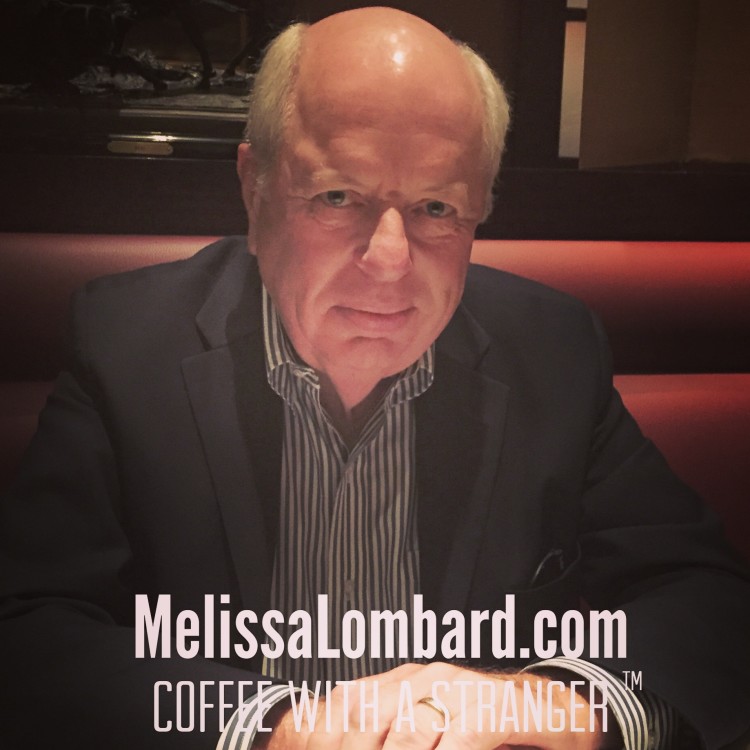
The Place: The Capital Grille
The Cup: This particular “coffee” was actually an iced tea, which we each ordered with our lunch. Dick informed me when we were making our arrangements that he was not a coffee guy. He wondered if we could chat over lunch instead and suggested Capital Grille. He followed that up with a non-negotiable insistence that due to the way his mother raised him, he would be paying for the lunch and this was not open for discussion. Dick (as he’s known to his friends) is a true gentleman whose mother would be proud.
The Background: Coffee With A Stranger Cup 67, Eric Simone is the man I can thank for making this introduction. When I asked him about interesting people I should interview, he fired back an email almost immediately with the suggestion of Dick Benkendorf. And as most everyone knows, I want as little background information as possible — and Eric stuck to the rules, keeping the email intro brief.
Dick has lived a large life, and has no intentions, it seems, of slowing down. He’s built some incredibly successful businesses, but surprisingly, we talk little about those achievements. The subjects we cover, linger on, and keep returning to, in our time together, reveal Dick’s priorities and suggest the things most important to him. Perhaps they even offer insight into the making of a successful life. We’ll get into all that, but first, let’s cover some:
Common Grounds:
- What’s your guilty pleasure? Popcorn. {And not just any popcorn. Dick tells me he’s a popcorn connoisseur, and his favorite is a small kernel variety called White Country Gentleman that he orders from Illinois.}
- How did you make your first buck? As a newspaper boy in Bushnell, Illinois. I loved it. I knew all the people.
- What is the best place to eat in Austin? Perry’s.
- What is the best way to unwind? I like to play golf. It helps me get away from everything.There are 3 types of competition in golf: playing against the course, playing against others, and playing against yourself. I’m competitive by nature. It’s compelling to me; I have to do it. I go out about once a week. Don’t have time to go more than that. It’s good exercise too. I like to walk, as opposed to ride.
- What is the last thing you fixed? I changed a lightbulb yesterday.
- What is one of the best books you’ve ever read? Mystagogy by Enrico Mazza – a book about philosophy and economics and how they interact in the world. It’s deep.
- What’s the best gift you ever got? A train set that my mom and dad gave me. We had a tradition of going to bed early — just after church, on Christmas Eve, and we awoke the next morning to gifts. When I was about 4 years old, I got the Blue Zephyr train set, and I can still remember that Christmas morning. My grandson has the train now.
Dick was raised in a small Illinois town of less than 4,000 people. His father was a physician and served in World War II, and his mother was busy raising seven children. Dick recalls, with a bit of nostalgia, the days of his youth when his mother would send him to the “little store” to pick up a few things and the grocer would simply jot it down, knowing Dick’s mom would take care of the tab at some point. When I mention I often think longingly of simpler days, he tells me, “The older you get, the more you want to remember the good old days.”
Present Days
I ask Dick about the most significant thing that’s happened for him in the last 30 days and he says, “The offer we received to sell a company. It won’t close for another 31 days, but the offer is the most significant thing that’s happened in the last month.” I want to know how long he’s had the business and if it will be emotionally difficult in any way. He tells me, “We’ve had it for over 10 years. It will be good because we’ve spent a lot of time and effort getting the management structured, and the sale will be well worth it for them. It’s been rewarding to help others realize their dream.” But is selling a business hard, emotionally? Dick says, “No,” adding, “I can be emotional about people. But I can’t be emotional about dollars or business. That’s the way I live.”
In Dick’s opinion, the biggest issue facing society today is the US government. He says, “We’re going down a path now that my children and grandchildren will have to pay dearly for. All of the initiatives and money that are being wasted; we’re going to pay a piper someday. And your world is going to be tremendously impacted. We’re out of control.” I ask Dick to get more specific and he adds, “Government is over-controlled with regulations in almost every facet of business. Which is very expensive and more than that, it’s ruining initiative. So you have the regulatory side and then you have the raw spending side. I don’t like the way my money is being spent and I don’t like the tax system.” He laughs when he adds, “I could do a much better job.”
I tell him my feeling is that if there were a reset button, I think we’d all be ready to push it. He tells me, “I’m not fully a fan of Trump; there are a lot of things I don’t like. But you have to admire what he’s accomplished, outside of marriage.” I ask him what he thinks of his diplomacy skills and we both laugh and agree he’s certainly not a perfect candidate.
Return to Basics
What is something Dick thinks should be taught in school, but isn’t? He says, “I don’t think the fundamentals of education are being taught anymore. We’re teaching all this, what I would call, “semi-social teaching” that has nothing to contribute to the kids — like reading, writing and arithmetic. That’s why I’ve always selected the best schools for my kids, because I want them to have the best education. It’s really so important.”
Character
When I ask Dick about his best character trait, he tells me,”I’m still working on that. I’ve been gifted with so much. I think it’s the recognition that I am only here for a short time. The older I get, the more I realize that my contribution really is to other people, not to me. My gift is recognizing that. It keeps me out of the selfish mode. Every business deal has a lot of variables. I think that I’m grateful that I’m able to understand and make those things work the right way.”
How about a character trait he’s working on? Dick says, “Openness. I have always been pretty private. I find myself answering questions I would have never answered 15 years ago. Like this conversation would have never happened. I would have said, ‘What’s the point?’ Not to be ugly, just ‘why?’ ‘What do you want to know that for?’ Dick goes on to tell me he has his wife to thank for that. She encourages him to be open.
I ask Dick if he’s found benefits to being open and he says, “I don’t look at it that way. People have always been more open to me than vice-versa. Now I find it almost overwhelming. People will ask for help and it’s a gift that I can help them. It’s not always monetarily either. I’ve become a mentor to a lot of people. I don’t think they would have asked 20 years ago. I was just too private. It took me a long time to get here.”
Surprises
I want to know what Dick thinks people might be surprised to learn about him and he shares, “I think that because of this privacy approach I’ve taken for so many years, my life is compartmentalized with people in different ways. For example, I’ve got golf buddies who know nothing about what I do in business. My kids don’t know what I do. They don’t understand it. So I have this compartmentalized life that’s hard for people to grasp what I do.”
Well, what do you do? I ask. To which Dick replies, “I am an investor that invests very strategically with a defined set of criteria into companies that I understand. I don’t invest in things I don’t understand. They’re companies that deliver recurring revenue streams from the confluence of computing and communications technologies. There are twelve criteria that I go through to see if we want to invest. There are usually around 600 companies a year that we look at and we invest in 2-3 a year. So we are pretty selective.” I imagine that must take many people, many hours of work and Dick tells me, “Surprisingly no. It takes about 30 seconds to screen each one. And 80% of them I never see because they are screened out immediately.”
Happy Life
If happiness were the national currency, I want to know how Dick would make his living. He tells me this, “I have a resentment in life. Since 1990 I’ve been doing exactly what I’m doing today. Early in my career, I spent 15 years at IBM doing what I learned in five years. I was doing the same thing over and over and over again. I wasn’t learning more. I wish I had left IBM after 5 years and started doing what I’m doing now. I wold have had a lot more fun, because I love what I’m doing now. I’m having a ball. So, I don’t want to change anything right now; with my life, my family, business. I’m happy!”
And I believe him. When I ask about Dick’s perfect day — what he describes is the way he spends pretty much every day. A series of business meetings, beginning before breakfast (the meal Dick is least fond of, incidentally), dinner with his wife, with or without friends and then do it all over again. When I ask if golf would be in that perfect day he says, “No.” Adding, “It’s more important for me to be with my wife and be doing business.”
Grateful Heart
Clearly, Dick has much to be grateful for, and he’s clear about that. I want to know what he’s most grateful for and he tells me it’s his family and his faith. His faith comes from the example set by his grandmother and his parents. They lived their faith and it showed up in everything they did. Dick tells me he’s a strong believer and he practices his faith.
He goes on to describe a daily practice where he prays for six things: His faith, forgiveness of his sins, his family, his friends, his health, and the one he says that often confuses people which he describes as, “The way I’ve been gifted by the Lord to live better than I should live. I have a lot of financial gifts that have been gifted to me. I know they are not actually mine. I’m just borrowing them.”
If Dick had 30 seconds to make a speech to the world, this is what he shares with me: “At this point, I’m really influenced by what I heard from the Pope while he was here and I was overwhelmed by how little he understood the economic structure of the United States. Somehow I would like the world to understand that democracy and capitalism and faith are all in one bucket. I’d like to get that message across because the Pope comes from a socialist environment and he tends to think of socialism in a classic way. We look at it as we are trying to solve the problems of the poor with our generosity and our charity. And by business — they way we pay people, etc. He looks at it almost as the classic clash between the haves and the have-nots. He doesn’t understand that democracy and capitalism are the ways to work out of that. Instead his strategy is to take from the rich; the successful and give it to others. Which doesn’t solve the problem at all in my view. It just makes people dependent. There’s a lot of implications to that. There are very few countries where those three come together like they do in the US. My concern is that preaching like that hurts the US. Not intentionally, of course. Capitalism is an exchange and that’s important to remember.”
My conversation with Dick was unique and full of surprises. We talked a lot about business, and it’s clear Dick is someone who absolutely loves what he does. And he’s good at it. But it’s clear that the rewards that come from his efforts go far beyond money in the bank. He’s a family man who does express regrets about not being home more when his kids were young. He’s passionate about helping people — whether it’s the people who work for him, the people who’s companies he’s investing in or the countless professionals he’s mentored over the years. Dick is also clear about his earthly rewards and not only is quick to express deep gratitude for all he has and the opportunities he’s been given, but he’s also humble enough to recognize that he’s simply the steward of what he’s surrounded with.
Dick’s life is large. And after my time with him, I can safely say, he has a heart to match it.
__
If you enjoyed this interview, “Like” the Coffee With A Stranger Project Facebook page and you’ll be the first to know about upcoming interviews with new strangers and other fun stuff. If there’s someone in Austin you think I need to have coffee with, let me know and I’ll do my best to sweet talk them into having coffee with a stranger.

